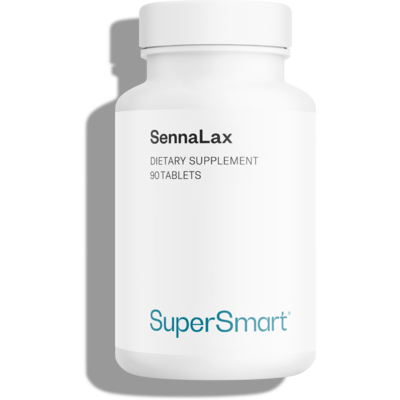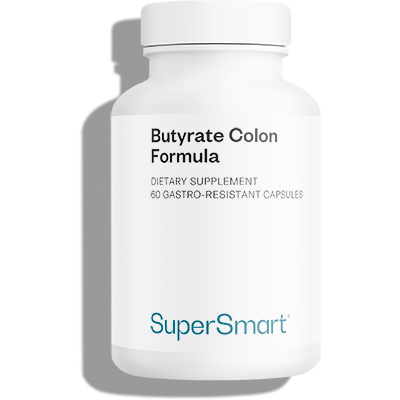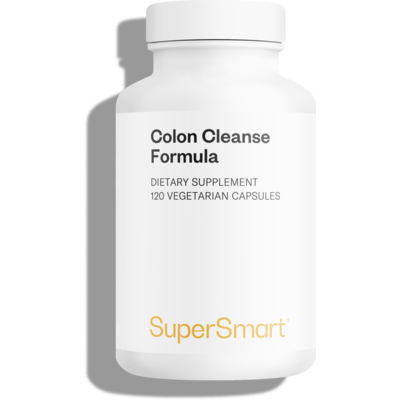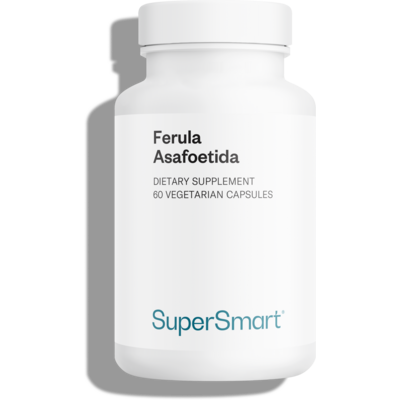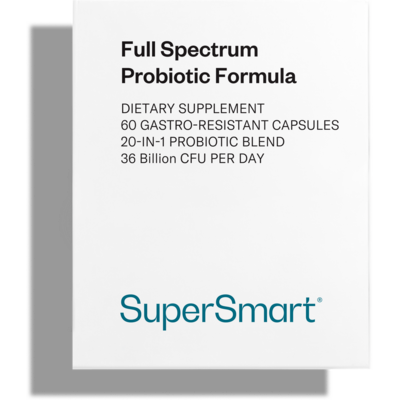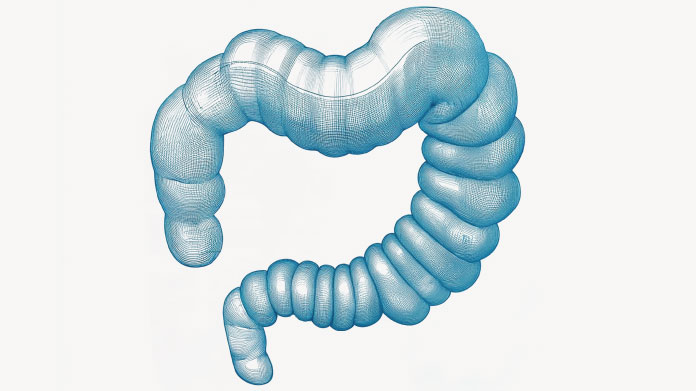Sluggish Bowel: Symptoms, Causes & Natural Remedies
Bloating, slow digestion, a feeling of heaviness... A sluggish bowel can quickly spoil everyday life. Find out what causes it, what the symptoms are and, above all, what natural remedies are effective in gently boosting your bowel function.

What is a sluggish bowel?
A sluggish bowel, sometimes called a ‘lazy gut’, is mainly characterised by slow intestinal transit.
It is generally accompanied by a feeling of heaviness in the abdomen, bloating, gas and, at times, mild to moderate constipation.
Unlike chronic constipation, which is persistent and may require medical treatment, a sluggish bowel is an intermittent functional disorder, linked to less efficient bowel activity.
Although similar, it is also different from occasional constipation, which occurs in isolation, often following a change in lifestyle (when travelling, after a change in diet, etc.).
This digestive disorder, which is common but sometimes downplayed, can have a real impact on quality of life, causing abdominal discomfort, fatigue, reduced energy or even mood changes.
What causes a sluggish bowel?
Several factors can explain the phenomenon of a sluggish bowel. They are often linked to our modern lifestyles:
- being too sedentary: lack of physical activity naturally slows down bowel movements;
- eating a diet too low in fibre, too high in refined sugars, ultra-processed foods and alcohol: these factors contribute to intestinal inertia;
- experiencing stress, anxiety, chronic fatigue or overwork: as the brain and intestine are closely linked via the intestine-brain axis, an emotional imbalance can have a direct impact on transit (1);
- taking certain medications that can affect transit (particularly certain psychotropic or pain-relieving drugs) (2);
- having an imbalance in the intestinal microbiota: an impoverished or unbalanced flora slows down the fermentation of fibres and can lead to irregular transit (3).
Natural solutions to stimulate a sluggish bowel
Sluggish bowels are not inevitable, and there are a number of things you can do to boost their function.
Adopt a healthy lifestyle and diet to promote intestinal health
A sluggish bowel can often be improved with a few simple measures, with diet playing a key role:
- gradually increase your intake of dietary fibre (fruit, vegetables, wholegrain cereals, pulses) to stimulate intestinal peristalsis and improve stool consistency (4);
- make sure you add foods rich in prebiotics to your meals (onions, garlic, honey, etc.) to ‘feed’ the good bacteria in your intestines (5);
- drink enough water to hydrate the fibre you eat and make your stools softer;
- practise a gentle but regular form of physical activity (walking, swimming, yoga) to encourage abdominal movements that massage the abdomen and facilitate bowel movements;
- practice relaxation techniques (breathing, meditation, cardiac coherence) to calm the nervous system and help improve digestive problems.
Senna: a plant traditionally used to combat constipation
When constipation sets in, certain plants can provide rapid relief.
Senna, for example, is traditionally used to promote intestinal transit.
This plant contains sennosides which stimulate colonic contractions and reduce the absorption of water contained in the stools, which are then softer (6).
Senna is very powerful, so be sure to use it only occasionally and not for prolonged periods.
![]() Discover SennaLax, a dietary supplement containing senna extract standardised to 20% sennosides.
Discover SennaLax, a dietary supplement containing senna extract standardised to 20% sennosides.
Psyllium, aloe vera and fennel for regular intestinal cleansing
Soluble fibres are ideal for restoring regular bowel movements.
They are found in particular in blond psyllium, whose mucilage in the seed coat forms a lubricating gel when in contact with water.
This helps to facilitate intestinal transit and soften stools (7).
Aloe vera also supports gastrointestinal health by contributing to intestinal movement. Effective intestinal contractions are essential to promote stool evacuation (8).
For its part, fennel is traditionally recognised for its action on digestive comfort. It promotes good intestinal transit and helps with flatulence (9) and stomach spasms.
Fennel contains essential oils with a carminative action that prevents the formation of gas and facilitates its expulsion, while also having an antispasmodic effect.
![]() Discover Colon Cleanse Formula, a food supplement formulated with targeted natural extracts, including psyllium, aloe vera and fennel.
Discover Colon Cleanse Formula, a food supplement formulated with targeted natural extracts, including psyllium, aloe vera and fennel.
Butyrate and colon health
Butyrate is a short-chain fatty acid produced naturally by certain intestinal bacteria.
In the body, it plays a fundamental role in promoting the proper functioning of the colon by strengthening the intestinal barrier and helping balance the microbiota (10).
Tributyrin is a triglyceride made up of three butyrate molecules, which has been clinically studied in thousands of people suffering from IBS (Irritable Bowel Syndrome), a disorder characterised by stomach pains and transit problems.
![]() Discover Butyrate Colon Formula food supplement standardised to 50% tributyrin, also rich in flavonoids, turmeric and peppermint.
Discover Butyrate Colon Formula food supplement standardised to 50% tributyrin, also rich in flavonoids, turmeric and peppermint.
Ferula asafoetida for slow digestion
Native to Asia, Ferula asafoetida (or asafoetida) is a plant traditionally used in Ayurvedic medicine to combat gastrointestinal discomfort and reduce bloating.
This plant secretes a gum-resin when its root is cut. This contains compounds (coumarins, ferulic acids, terpenoids, etc.) and essential oils, several of which are thought to have antispasmodic properties (11).
![]() Discover our Ferula Asafoetida food supplement based on Asafin®, a high-quality asafoetidae resin extract.
Discover our Ferula Asafoetida food supplement based on Asafin®, a high-quality asafoetidae resin extract.
Probiotic strains to support a balanced intestinal microbiota
Certain probiotic strains, such as Lactobacillus and Bifidobacterium, support the balance of the intestinal microbiota.
An unbalanced intestinal microbiota can slow down transit. This is because the microbiota influences the contractility of the intestines (12) and the absorption of water and nutrients from food.
A balanced microbiota therefore helps to relieve gastrointestinal discomfort and symptoms such as abdominal pain and flatulence.
![]() Discover the Full Spectrum Probiotic food supplement, which contains 20 probiotic strains carefully selected and studied by the scientific community.
Discover the Full Spectrum Probiotic food supplement, which contains 20 probiotic strains carefully selected and studied by the scientific community.
SUPERSMART ADVICE
References
- Konturek PC, Brzozowski T, Konturek SJ. Stress and the gut: pathophysiology, clinical consequences, diagnostic approach and treatment options. J Physiol Pharmacol. 2011 Dec;62(6):591-9. PMID: 22314561.
- Szigethy E, Knisely M, Drossman D. Opioid misuse in gastroenterology and non-opioid management of abdominal pain. Nat Rev Gastroenterol Hepatol. 2018 Mar;15(3):168-180. doi: 10.1038/nrgastro.2017.141. Epub 2017 Nov 15. PMID: 29139482; PMCID: PMC6421506.
- Ohkusa T, Koido S, Nishikawa Y, Sato N. Gut Microbiota and Chronic Constipation: A Review and Update. Front Med (Lausanne). 2019 Feb 12;6:19. doi: 10.3389/fmed.2019.00019. PMID: 30809523; PMCID: PMC6379309.
- Guo K, Yao Z, Yang T. Intestinal microbiota-mediated dietary fiber bioavailability. Front Nutr. 2022 Oct 28;9:1003571. doi: 10.3389/fnut.2022.1003571. PMID: 36386954; PMCID: PMC9651179.
- Naseer M, Poola S, Uraz S, Tahan V. Therapeutic Effects of Prebiotics on Constipation: A Schematic Review. Curr Clin Pharmacol. 2020;15(3):207-215. doi: 10.2174/1574884715666200212125035. PMID: 32048977.
- Le J, Ji H, Zhou X, Wei X, Chen Y, Fu Y, Ma Y, Han Q, Sun Y, Gao Y, Wu H. Pharmacology, Toxicology, and Metabolism of Sennoside A, A Medicinal Plant-Derived Natural Compound. Front Pharmacol. 2021 Oct 26;12:714586. doi: 10.3389/fphar.2021.714586. PMID: 34764866; PMCID: PMC8576406.
- Jalanka J, Major G, Murray K, Singh G, Nowak A, Kurtz C, Silos-Santiago I, Johnston JM, de Vos WM, Spiller R. The Effect of Psyllium Husk on Intestinal Microbiota in Constipated Patients and Healthy Controls. Int J Mol Sci. 2019 Jan 20;20(2):433. doi: 10.3390/ijms20020433. PMID: 30669509; PMCID: PMC6358997.
- Hong SW, Chun J, Park S, Lee HJ, Im JP, Kim JS. Aloe vera Is Effective and Safe in Short-term Treatment of Irritable Bowel Syndrome: A Systematic Review and Meta-analysis. J Neurogastroenterol Motil. 2018 Oct 1;24(4):528-535. doi: 10.5056/jnm18077. PMID: 30153721; PMCID: PMC6175553.
- Jourshari MS, Rezasoltani P, Nazari M, Maroufizadeh S, Aski SK, Qobadighadikolaei R, Yousefbeyk F. A comparative study of fennel and dimethicone capsule effects on flatulence rate after cesarean section: A double-blind randomized controlled trial. J Educ Health Promot. 2024 Jul 29;13:251. doi: 10.4103/jehp.jehp_389_23. PMID: 39309989; PMCID: PMC11414845.
- Recharla N, Geesala R, Shi XZ. Gut Microbial Metabolite Butyrate and Its Therapeutic Role in Inflammatory Bowel Disease: A Literature Review. 2023 May 11;15(10):2275. doi: 10.3390/nu15102275. PMID: 37242159; PMCID: PMC10221771.
- Mahendra P, Bisht S. Ferula asafoetida: Traditional uses and pharmacological activity. Pharmacogn Rev. 2012 Jul;6(12):141-6. doi: 10.4103/0973-7847.99948. PMID: 23055640; PMCID: PMC3459456.
- Zheng Z, Tang J, Hu Y, Zhang W. Role of gut microbiota-derived signals in the regulation of gastrointestinal motility. Front Med (Lausanne). 2022 Jul 22;9:961703. doi: 10.3389/fmed.2022.961703. PMID: 35935766; PMCID: PMC9354785.
Keywords
1 Days
repeat customer
recommended by my doctor. easy to create an account. Discounts and specials are appreciated. packaging and delivery is dependable. Capsules easy to digest. I've had some some capsules and tablets that are broken inside their bottles.
Kokee
5 Days
Order was shipped on time and packaged…Wonderful Jobs!
Order was shipped on time and packaged excellently.
DMHoge
12 Days
great products and prices
great products and prices
Marie
18 Days
Easy to navigate site
Easy to navigate site, had what I was searching for, good price. easy order-check out
James Tucker
24 Days
My skin is clearing up nicely!
Pretty good for my skin so far.
Christian
26 Days
The new packaging is excellent
The new packaging is excellent - finally! No more squashed boxes and torn envelopes.
GORAN
27 Days
Great Product
Great Product
Larry Garrett
31 Days
Quick shipping
Quick shipping; good price. No issues!
Mary McCarty
33 Days
Thr product is very good and is helping…
Thr product is very good and is helping me on my health. Then is always on time
LUGO Luz
35 Days
Buying was fine
Buying was fine. I had problems with the website not recognizing my login info, and had to call to get it fixed. Other than that, everything was good.
David S. Clark
35 Days
Your super maca and super ginseng are…phenomenal
Your super maca and super ginseng are phenomenal supplements that compliment each other when taking them together. Fantastic feeling of well-being and lots of mid day energy without the crash.
Keith Mason
38 Days
I have had amazing results with every…
I have had amazing results with every supplement I've purchased. I am extremely satisfied with this company
kirstin Torres
38 Days
Fine products
Fine products . They are on the leading edge of online supplements. The only issue -so far-is they sometime run out of subscription items.
Jason Argos
41 Days
The ordering process is very user…
The ordering process is very user friendly and the products always come in a timely manner.
CARTER Rhonda
42 Days
The price for Dr
The price for Dr. Pero's AC-11 is reasonable and in line with his views. (my former colleague). Keep it pure.
CAMPBELL Clayton


